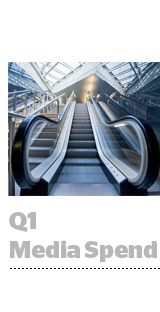 TV and digital are the twin wunderkinds of the ad industry.
TV and digital are the twin wunderkinds of the ad industry.
A report by WPP Group’s Kantar Media indicates a healthy 5.7% increase in total advertising expenditures to $34.9 billion for Q1 2014, led by big-brand advertisers’ TV ad buys for the Winter Olympics. Internet display ad spending meanwhile grew 13% for the quarter, which Kantar attributed to retail, financial and insurance marketers increasing spending.
Compared with 2013’s growth rate of about 1%, Kantar Media Chief Research Officer Jon Swallen said ad spending would have looked better even without the Winter Games’ approximately $600 million contribution with an increase of just under 4% for the quarter.
The findings validated a recent Magna Global ad spend report finding sustained ad industry strength, anticipating worldwide media spend growth of 6.4% in 2014.
Network TV ad buys were up 14.5%, buoyed by the Olympics, which accounted for about half of growth. The top 10 spenders in advertising had even more significant increases in spending for the quarter – including General Motors (55.8%), Pfizer (33.6%) and Fiat (38.8%) – partly thanks to NBC Universal’s strategy of selling larger ad packages to fewer buyers for the Olympics, Swallen said.
In total, the top 10 spent $4.4 billion on advertising, a 14.1% increase of $540 million year over year. More than 80% of this spending went toward TV ad buys, with six of the top 10 making “significant” buys for the Olympics – Proctor & Gamble, Comcast, General Motors, Pfizer, Berkshire Hathaway and AT&T. All but Proctor & Gamble increased year-over-year spending, with that company’s decline attributed to a pullback of its cosmetics and hair-care brands.
Kantar Media does not measure what portion of spending is funnelled through programmatic buying, though Swallen said the company is developing that research and conducting bench tests.
“We’re looking at ways to go deeper to be able to follow ads to the point of origin and to begin to identify programmatic ads,” Swallen said. “The market is increasingly interested in (programmatic), and we’re actively working to try to provide that data.”
On the surface, though, there may be indicators that programmatic spending is set to increase over the next year. The biggest advertising spender, Proctor & Gamble, accounted for $773.8 million in spending for the quarter and reportedly aims to buy 70-75% of its digital ads programmatically by the end of the year.











